
JUSTIN SPIKE
Mon, June 10, 2024
BUDAPEST, Hungary (AP) — The day after Hungarians voted in the European Parliament elections, Prime Minister Viktor Orbán's government declared a big win, but missing from the victory speeches was an acknowledgement that it was his party's worst performance in an EU election since Hungary joined the bloc 20 years ago.
The lackluster showing can largely be attributed to the emergence of a new political force in Hungary — Péter Magyar, a former insider in Orbán’s Fidesz-KDNP coalition, who broke with the party and declared his intention to build a popular movement to defeat Orbán and sweep away his autocratic system.
Eleven of Hungary’s 21 delegates to the EU’s legislature will come from Fidesz — more than any of its domestic competitors. After tallying 44% of Sunday's vote, the government said the result clearly signals overwhelming support for Orbán's hard-right nationalism.
“Never before have so many people, 2.015 million, voted for Fidesz-KDNP in an EP election,” spokesman Zoltán Kovács wrote Monday on the social media platform X. “The message is clear: Hungarians say no to war, migration, and gender ideology.”
Nonetheless, Fidesz has never performed so poorly in a European Union election since it joined in 2004. Votes for the party were down sharply from its 52% support in the 2019 polls, and it lost two of its European Parliament seats.
András Bíró-Nagy, an analyst and director of the Budapest-based think tank Policy Solutions, said the power of Orbán — who returned to office in 2010 — has never been more at risk.
“We are in an unknown territory because previously it was not imaginable that a single political party could mount a serious challenge to Viktor Orbán,” Bíró-Nagy said.
Magyar's new party, Respect and Freedom (TISZA), won nearly 30% of the vote on Sunday, earning seven delegates in the EU legislature. He has said the election would propel his movement into a stronger position to challenge and defeat Orbán in the next national ballot, scheduled for 2026.
Late Sunday, thousands of Magyar's supporters gathered next to the Danube River to await the election results. Addressing the jubilant crowd, Magyar said his party's performance was a “political landslide" that would usher in a new era of “useful, fair and, especially, honest” governance.
"Today marks the end of an era," Magyar said. “This is the Waterloo of Orbán’s factory of power, the beginning of the end,” he said, referring to the battle that ended the Napoleonic Wars.
Magyar campaigned less on a specific party program than a structural critique of Orbán's system, which he characterized as rife with corruption, nepotism, intimidation and propaganda.
He derided the condition of Hungary's education and health care systems, accused Fidesz of creating a class of oligarchs enriched with lucrative public contracts, and vowed to form a more constructive relationship with the EU.
Hungary's traditional opposition parties, through pressure from Orbán's government and their own fractiousness and infighting, have been unable to mount a serious challenge to Fidesz in the past 14 years.
“The Péter Magyar phenomenon is the symptom of a deep crisis in Hungarian politics," said Bíró-Nagy. “This reflects not only some disillusionment with the Orbán regime, but it shows the complete disillusionment with the established opposition.”
"Many people in Hungary are craving for something new, are craving for change, and they are willing to support basically anybody who shows potentially some strength against the Orbán regime,” he said.
Magyar's rise followed a series of scandals that rocked Orbán's government and prompted the resignation of the president and justice minister. A deep economic crisis, compounded by the highest inflation in the 27-member EU, also led to a drop in popularity for the bloc's longest-serving leader.
Meanwhile, the EU has frozen more than 20 billion euros ($21.5 billion) to Hungary over its violations of rule-of-law and democracy standards, and Orbán's friendly relations with Russian President Vladimir Putin have pushed him further into the margins from his EU and NATO allies.
Ahead of the elections, the five-time prime minister campaigned on an anti-EU platform, and cast the ballot as a contest that would decide whether Russia’s war in Ukraine would engulf Europe.
He relied heavily on culturally divisive issues such as migration, LGBTQ+ rights and fears that the war could escalate to involve Hungary directly if his political opponents were successful.
But Fidesz's weakened position suggests Orbán’s hopes that the EU election would consolidate euroskeptic parties and deliver him a bigger role on Europe’s far-right have likely been dashed.
"Orbán has already taken the place of the radical right in Hungarian politics,” Bíró-Nagy said. “But the breakthrough that Viktor Orbán was hoping for didn’t materialize at the European level.”
Europe's far right surge had some notable exceptions
Diego Mendoza
Mon, June 10, 2024
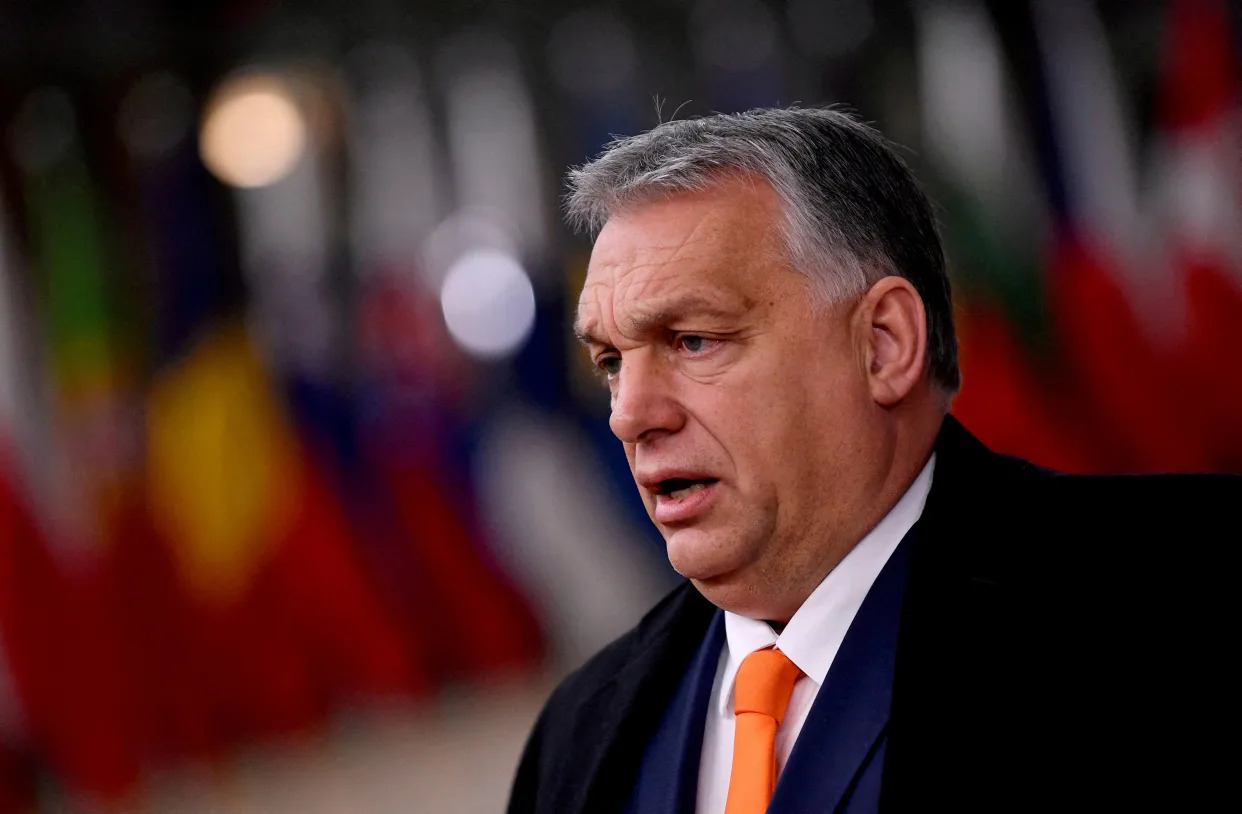
Insights from the Foreign Policy Research Institute, Norran, and Politico
The News
The far right made substantial gains in the European Parliament elections, but their success wasn’t universal.
In Hungary, Sweden, and Belgium, far-right parties that were expected to make significant headway ultimately stagnated, with many voters more concerned about party corruption and less about migration.
SIGNALSSemafor Signals: Global insights on today's biggest stories.
Hungary’s Orbán has new fierce rival in former partnerSources: Euronews, Foreign Policy Research Institute
Hungary’s Fidesz populist party — which has been led by Prime Minister Viktor Orbán since 2010 — scored about 45% of the vote, the first time the party has won less than 50% in the European parliamentary elections since 2004. While Fidesz will still send the most delegates to Brussels, the Tisza party — led by former Orbán ally Péter Magyar, who campaigned on cleaning up Fidesz’ corruption — made stunning gains, taking nearly 30% of the vote. Political analyst András Tóth-Czifra noted that Tisza’s performance is “by no means some kind of liberal upsurge” but rather voter “exhaustion after 14 years of Fidesz rule.”
Leftist parties drown out far right in SwedenSources: Norran, Associated Press
In Sweden, both The Left Party and The Greens made impressive gains, while the opposition center-left Social Democrats’ goal “was mainly to avoid losing votes for the first time in an EU election,” according to Swedish newspaper Norran. The far-right Sweden Democrats party, meanwhile, trailed behind others, coming in with 2% less votes than the last election. Voters were likely turned off by revelations that the Democrats used fake social media accounts to push their agenda, spread misinformation, and badmouth other contenders, according to the Associated Press. Migration was also not as pressing an issue for northern European voters, said one think tank analyst.
Belgium shifts more to the right, but avoids ‘extremist’ takeoverSource: Politico
An “expected extremist landslide didn’t happen” in Belgium, according to Politico, but right-wing parties did make significant gains. The country’s mainstream had anticipated a far-right sweep in the north that could have kickstarted a plan to break up the country. But the far-right Vlaams Belang party, in the northern Dutch-speaking region where it was expected to make the most gains, failed to defeat the more moderate New Flemish Alliance (N-VA) that came in first with 17% of the vote. And in the Wallonia Francophone region of Belgium, the center-right Reformist Movement (MR) gained the most French-speaking votes, ultimately forcing Prime Minister Alexander De Croo to resign following his moderate Open VLD party’s underperformance. Although forming coalitions in Belgium is “notoriously difficult,” the N-VA and MR have already signaled their willingness to work together, Politico wrote.
Orban Rules Out Early Hungary Elections After New Rival’s Surge
Veronika Gulyas
Mon, June 10, 2024
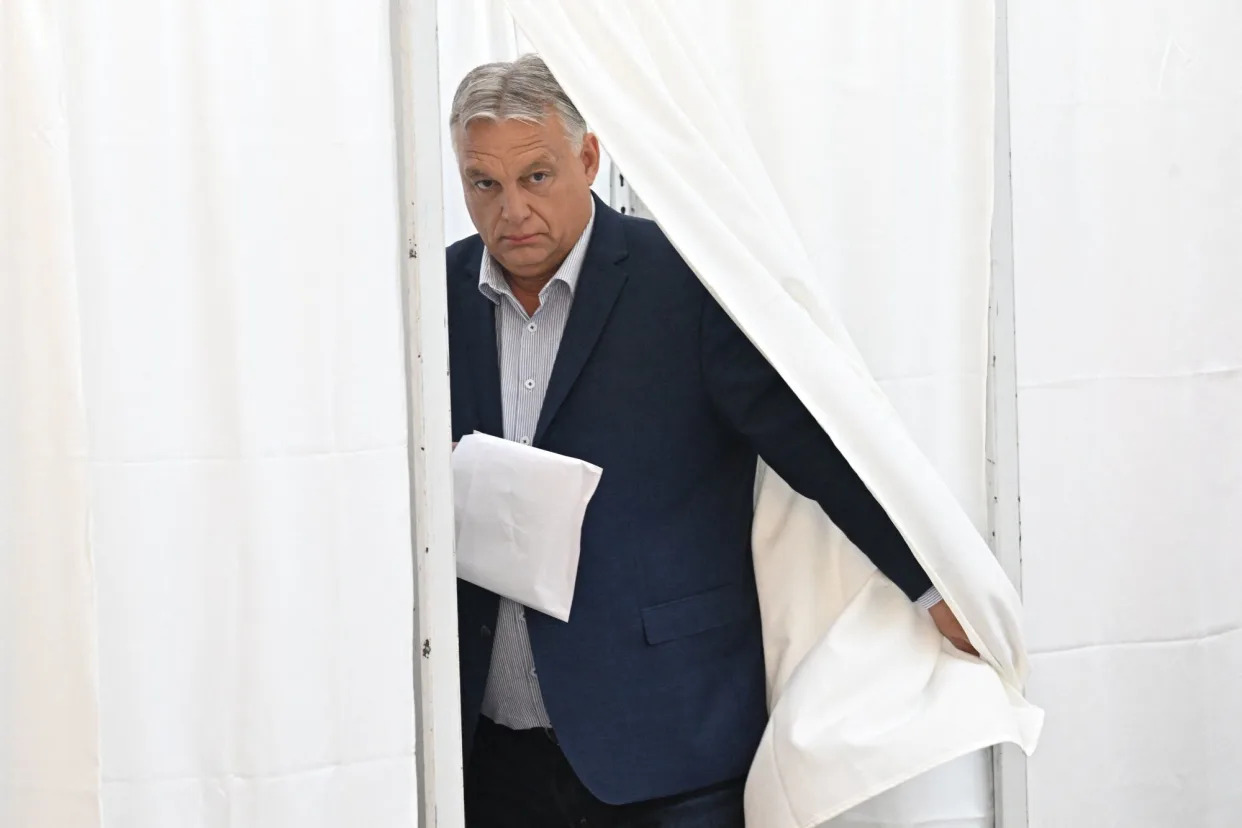
(Bloomberg) -- Hungarian Prime Minister Viktor Orban ruled out holding early parliamentary elections to cement his advantage in local and European Union ballots following a surprisingly strong showing by a new rival.
Orban said the next general election will be held in 2026, giving his government time to improve on its result, according to a state television interview broadcast on Monday. While Orban’s Fidesz placed first in the European Parliament vote, it was its worst-ever result after political upstart Peter Magyar’s Tisza posted big gains, including in ruling party strongholds.
NATO chief says Hungary has agreed not to veto alliance's assistance to Ukraine
The far right made substantial gains in the European Parliament elections, but their success wasn’t universal.
In Hungary, Sweden, and Belgium, far-right parties that were expected to make significant headway ultimately stagnated, with many voters more concerned about party corruption and less about migration.
SIGNALSSemafor Signals: Global insights on today's biggest stories.
Hungary’s Orbán has new fierce rival in former partnerSources: Euronews, Foreign Policy Research Institute
Hungary’s Fidesz populist party — which has been led by Prime Minister Viktor Orbán since 2010 — scored about 45% of the vote, the first time the party has won less than 50% in the European parliamentary elections since 2004. While Fidesz will still send the most delegates to Brussels, the Tisza party — led by former Orbán ally Péter Magyar, who campaigned on cleaning up Fidesz’ corruption — made stunning gains, taking nearly 30% of the vote. Political analyst András Tóth-Czifra noted that Tisza’s performance is “by no means some kind of liberal upsurge” but rather voter “exhaustion after 14 years of Fidesz rule.”
Leftist parties drown out far right in SwedenSources: Norran, Associated Press
In Sweden, both The Left Party and The Greens made impressive gains, while the opposition center-left Social Democrats’ goal “was mainly to avoid losing votes for the first time in an EU election,” according to Swedish newspaper Norran. The far-right Sweden Democrats party, meanwhile, trailed behind others, coming in with 2% less votes than the last election. Voters were likely turned off by revelations that the Democrats used fake social media accounts to push their agenda, spread misinformation, and badmouth other contenders, according to the Associated Press. Migration was also not as pressing an issue for northern European voters, said one think tank analyst.
Belgium shifts more to the right, but avoids ‘extremist’ takeoverSource: Politico
An “expected extremist landslide didn’t happen” in Belgium, according to Politico, but right-wing parties did make significant gains. The country’s mainstream had anticipated a far-right sweep in the north that could have kickstarted a plan to break up the country. But the far-right Vlaams Belang party, in the northern Dutch-speaking region where it was expected to make the most gains, failed to defeat the more moderate New Flemish Alliance (N-VA) that came in first with 17% of the vote. And in the Wallonia Francophone region of Belgium, the center-right Reformist Movement (MR) gained the most French-speaking votes, ultimately forcing Prime Minister Alexander De Croo to resign following his moderate Open VLD party’s underperformance. Although forming coalitions in Belgium is “notoriously difficult,” the N-VA and MR have already signaled their willingness to work together, Politico wrote.
Orban Rules Out Early Hungary Elections After New Rival’s Surge
Veronika Gulyas
Mon, June 10, 2024

(Bloomberg) -- Hungarian Prime Minister Viktor Orban ruled out holding early parliamentary elections to cement his advantage in local and European Union ballots following a surprisingly strong showing by a new rival.
Orban said the next general election will be held in 2026, giving his government time to improve on its result, according to a state television interview broadcast on Monday. While Orban’s Fidesz placed first in the European Parliament vote, it was its worst-ever result after political upstart Peter Magyar’s Tisza posted big gains, including in ruling party strongholds.
NATO chief says Hungary has agreed not to veto alliance's assistance to Ukraine
LORNE COOK
Wed, June 12, 2024
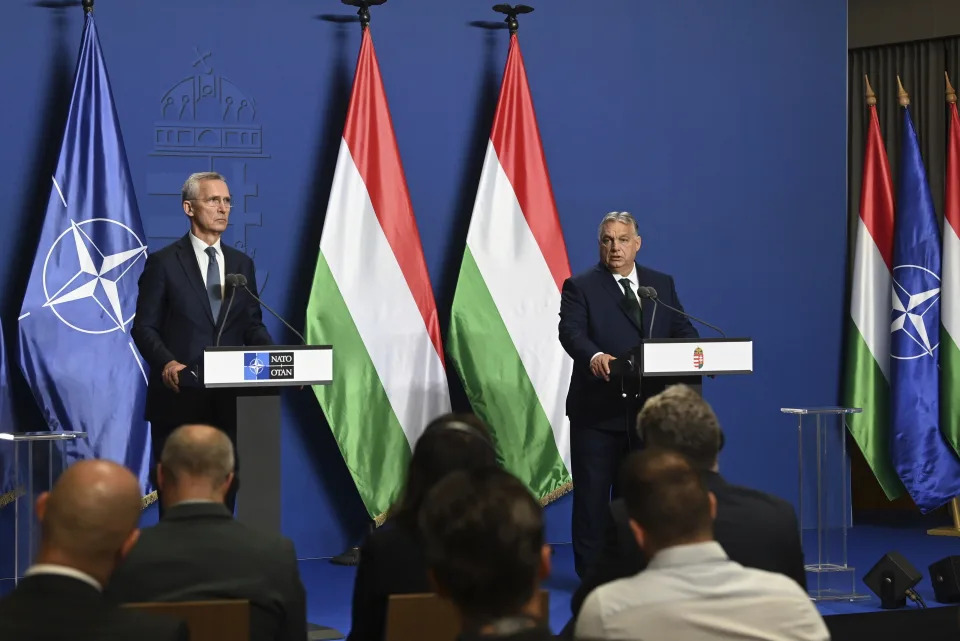
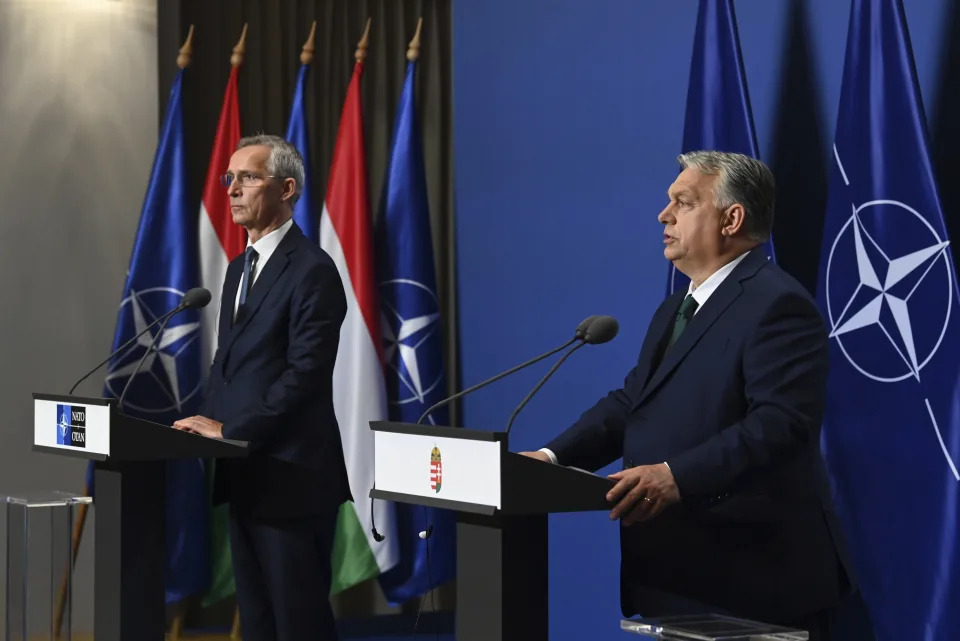
Hungarian Prime Minister Viktor Orban, right, and NATO Secretary General Jens Stoltenberg hold a press conference following their meeting in the government headquarters in Budapest, Hungary, Wednesday, June 12, 2024.
(Zoltan Mathe/MTI via AP)
BRUSSELS (AP) — Hungary has agreed not to block NATO from giving support to Ukraine but it will not provide any personnel or funds to help the war-ravaged country, NATO Secretary-General Jens Stoltenberg said Wednesday.
At a summit in Washington next month, U.S. President Joe Biden and his NATO counterparts are expected to agree on a new system for providing more predictable and long-term security assistance and military training to Ukraine's beleagured armed forces.
“Hungary will not participate in these NATO efforts and I accept this position,” Stoltenberg told reporters in Budapest, after talks with Hungarian Prime Minister Viktor Orbán.
Stoltenberg said that he and Orbán had “agreed modalities for Hungary’s non-participation in NATO’s support for Ukraine.” NATO’s top civilian official did not elaborate on how that would work.
“No Hungarian personnel will take part in these activities and no Hungarian funds will be used to support them,” Stoltenberg said.
“At the same time, the prime minister has assured me that Hungary will not oppose these efforts, enabling other allies to move forward, and he has confirmed that Hungary will continue to meet its NATO commitments in full,” Stoltenberg added.
NATO takes all its decisions by consensus, effectively giving any one of the 32 allies a veto.
Hungary’s stridently nationalist government has increasingly become a thorn in the side of NATO — and the European Union — by undermining their efforts to help Ukraine. All other allies agree that Russia’s war on Ukraine poses an existential threat to European security.
Orbán, seen as one of the friendliest European leaders toward Russian President Vladimir Putin, styles himself as a peacemaker, and has labelled his EU and NATO partners assisting Ukraine as being “pro-war.” He has also advocated for former U.S. President Donald Trump's victory in the November election.
Since Russia’s full-fledged invasion in February 2022, Ukraine’s Western backers have routinely met as part of the Ukraine Defense Contact Group, run by the Pentagon, to drum up weapons and ammunition for Kyiv.
Stoltenberg has spearheaded an effort to have NATO coordinate that process. As an organization, the military alliance does not send weapons to Ukraine and has no plans to do so but many of its members give help on a bilateral basis.
NATO allies provide more than 90% of the military support that Ukraine receives.
Plans are afoot for NATO’s leaders to commit on July 9-11 to maintain the level of military support they have provided Ukraine since the invasion began. The world's biggest security organization estimates the amounts to around $40 billion worth of equipment each year.
At their summit in Lithuania last year, Biden and his counterparts promised that they would “be in a position to extend an invitation to Ukraine to join the alliance when allies agree and conditions are met.” The consensus among members now is that it should not happen while war rages on.
BRUSSELS (AP) — Hungary has agreed not to block NATO from giving support to Ukraine but it will not provide any personnel or funds to help the war-ravaged country, NATO Secretary-General Jens Stoltenberg said Wednesday.
At a summit in Washington next month, U.S. President Joe Biden and his NATO counterparts are expected to agree on a new system for providing more predictable and long-term security assistance and military training to Ukraine's beleagured armed forces.
“Hungary will not participate in these NATO efforts and I accept this position,” Stoltenberg told reporters in Budapest, after talks with Hungarian Prime Minister Viktor Orbán.
Stoltenberg said that he and Orbán had “agreed modalities for Hungary’s non-participation in NATO’s support for Ukraine.” NATO’s top civilian official did not elaborate on how that would work.
“No Hungarian personnel will take part in these activities and no Hungarian funds will be used to support them,” Stoltenberg said.
“At the same time, the prime minister has assured me that Hungary will not oppose these efforts, enabling other allies to move forward, and he has confirmed that Hungary will continue to meet its NATO commitments in full,” Stoltenberg added.
NATO takes all its decisions by consensus, effectively giving any one of the 32 allies a veto.
Hungary’s stridently nationalist government has increasingly become a thorn in the side of NATO — and the European Union — by undermining their efforts to help Ukraine. All other allies agree that Russia’s war on Ukraine poses an existential threat to European security.
Orbán, seen as one of the friendliest European leaders toward Russian President Vladimir Putin, styles himself as a peacemaker, and has labelled his EU and NATO partners assisting Ukraine as being “pro-war.” He has also advocated for former U.S. President Donald Trump's victory in the November election.
Since Russia’s full-fledged invasion in February 2022, Ukraine’s Western backers have routinely met as part of the Ukraine Defense Contact Group, run by the Pentagon, to drum up weapons and ammunition for Kyiv.
Stoltenberg has spearheaded an effort to have NATO coordinate that process. As an organization, the military alliance does not send weapons to Ukraine and has no plans to do so but many of its members give help on a bilateral basis.
NATO allies provide more than 90% of the military support that Ukraine receives.
Plans are afoot for NATO’s leaders to commit on July 9-11 to maintain the level of military support they have provided Ukraine since the invasion began. The world's biggest security organization estimates the amounts to around $40 billion worth of equipment each year.
At their summit in Lithuania last year, Biden and his counterparts promised that they would “be in a position to extend an invitation to Ukraine to join the alliance when allies agree and conditions are met.” The consensus among members now is that it should not happen while war rages on.
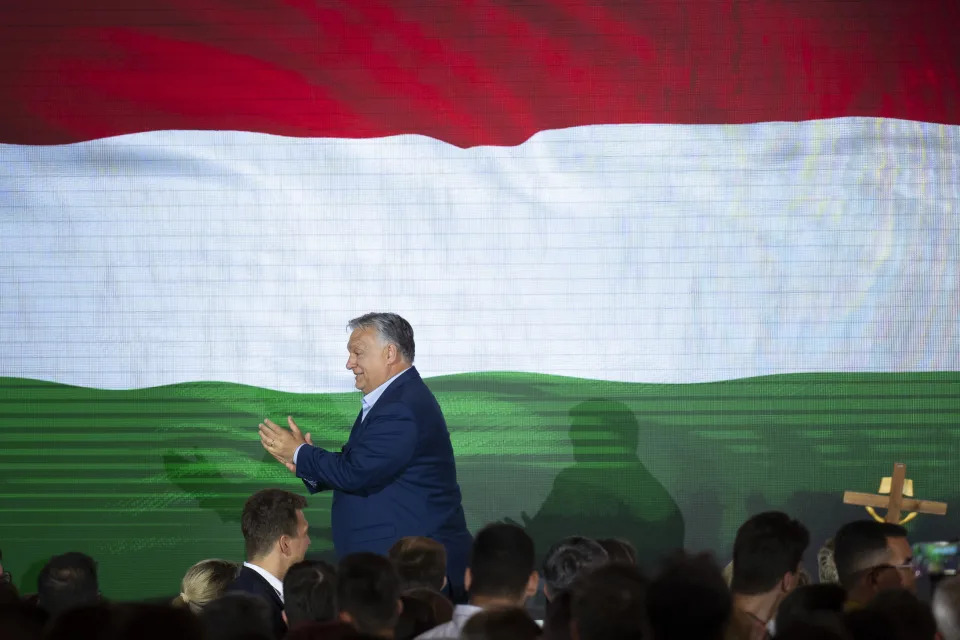
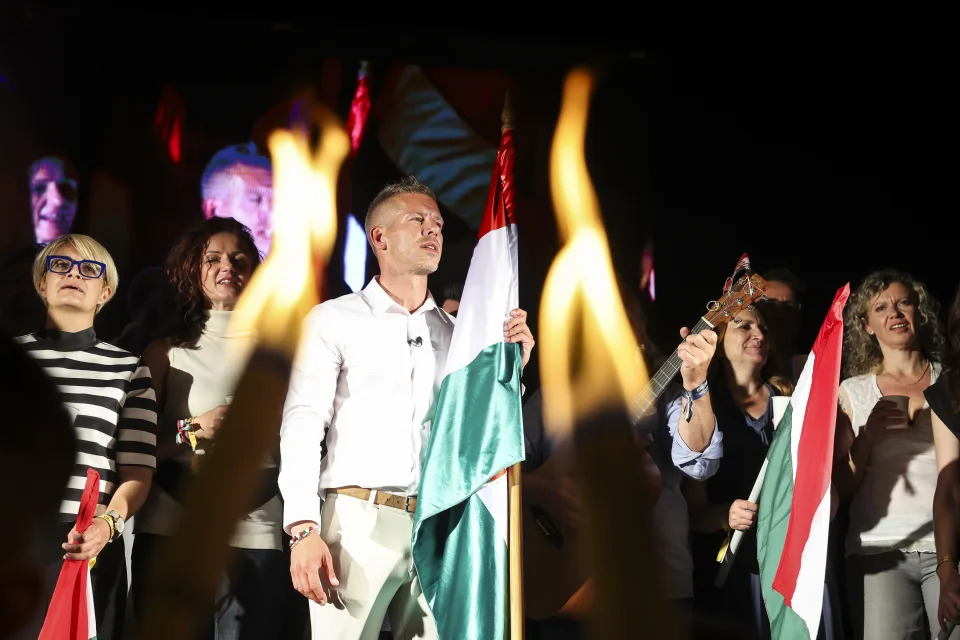
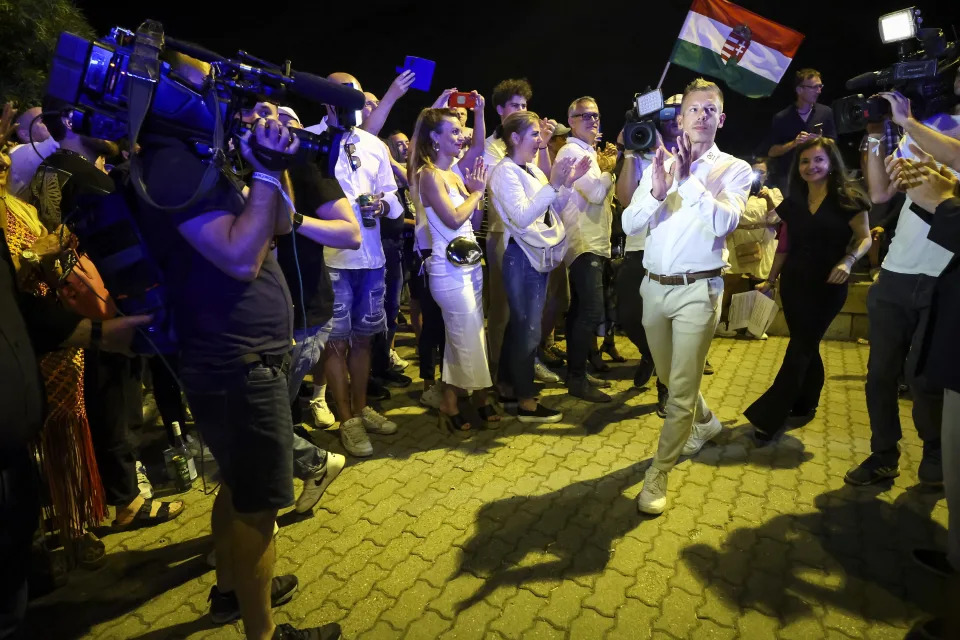
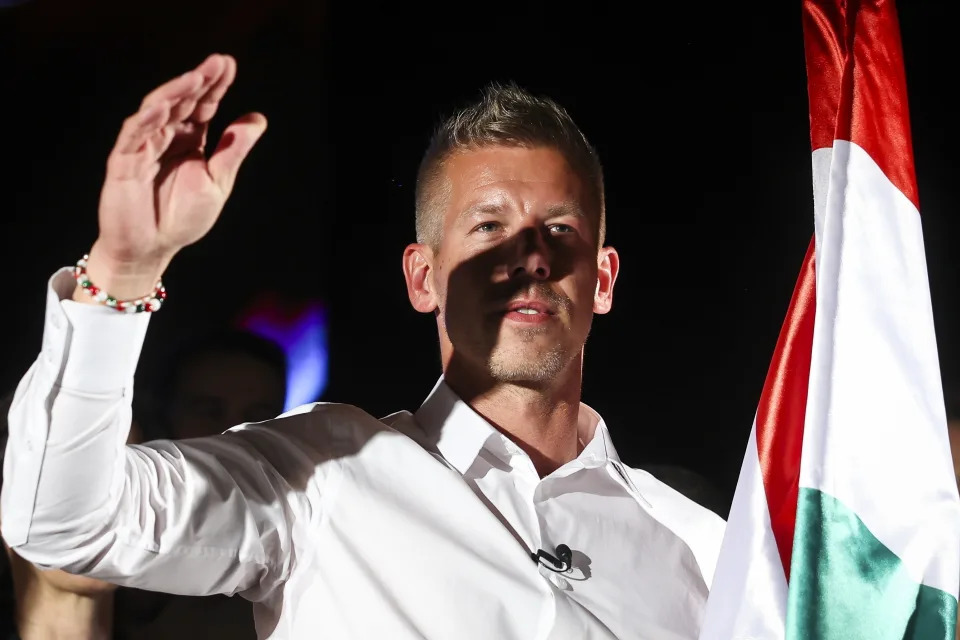
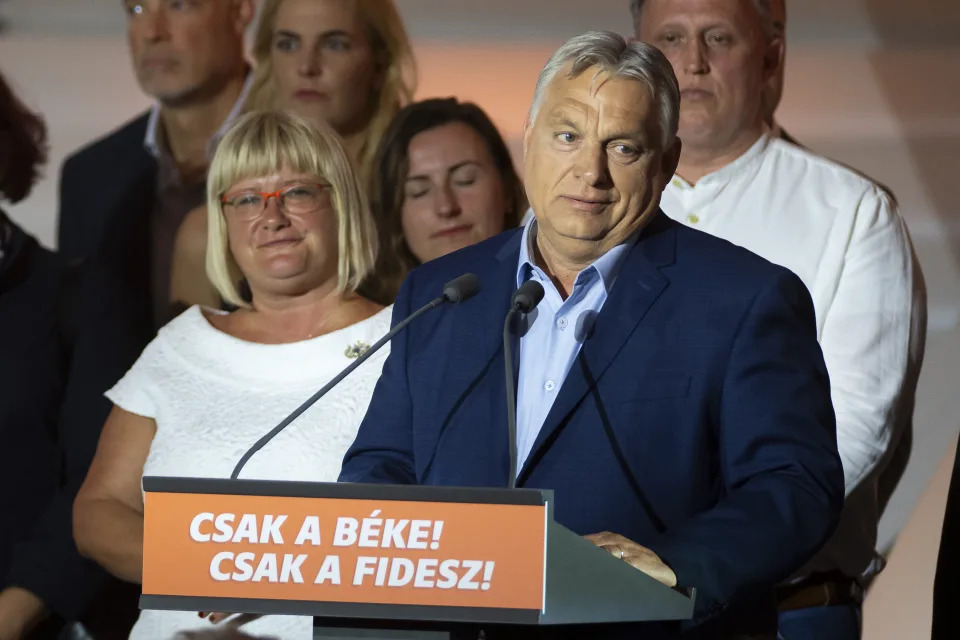
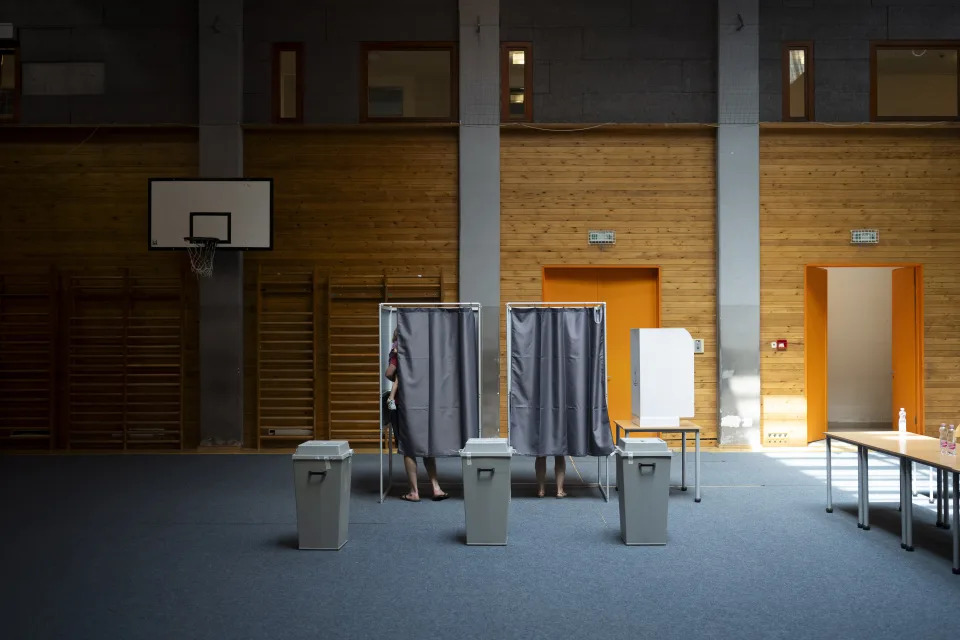
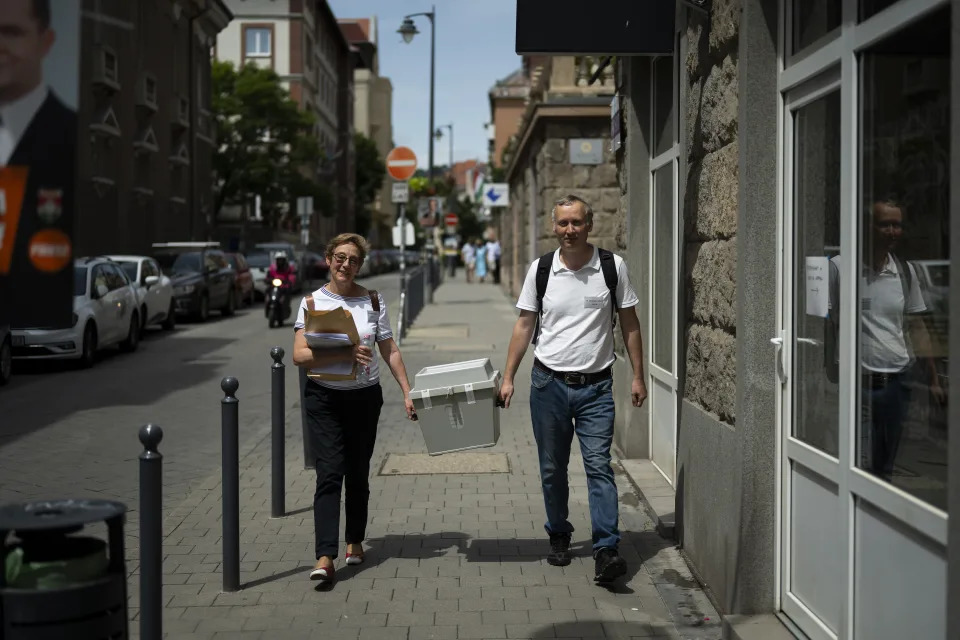
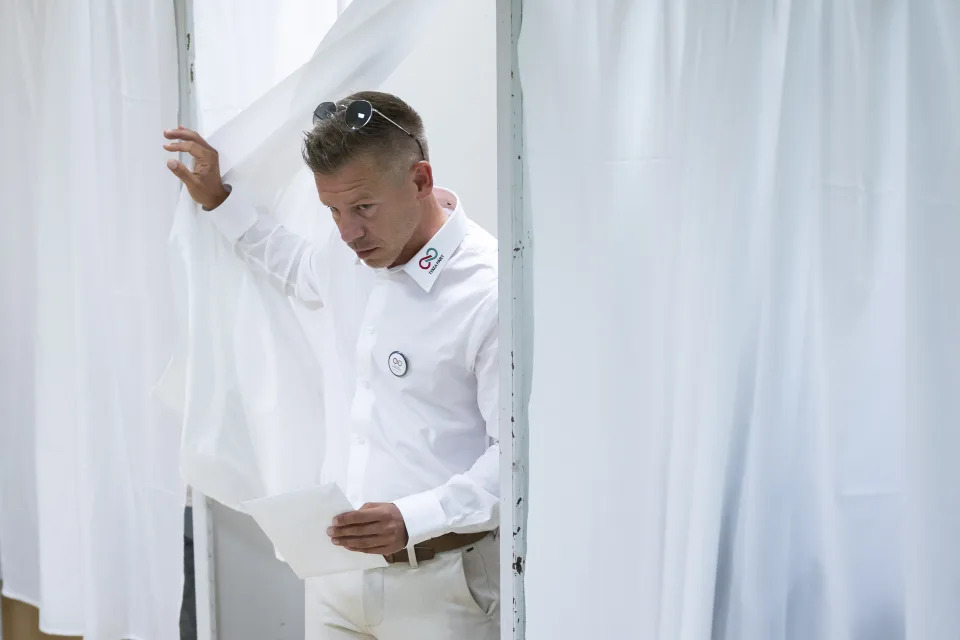
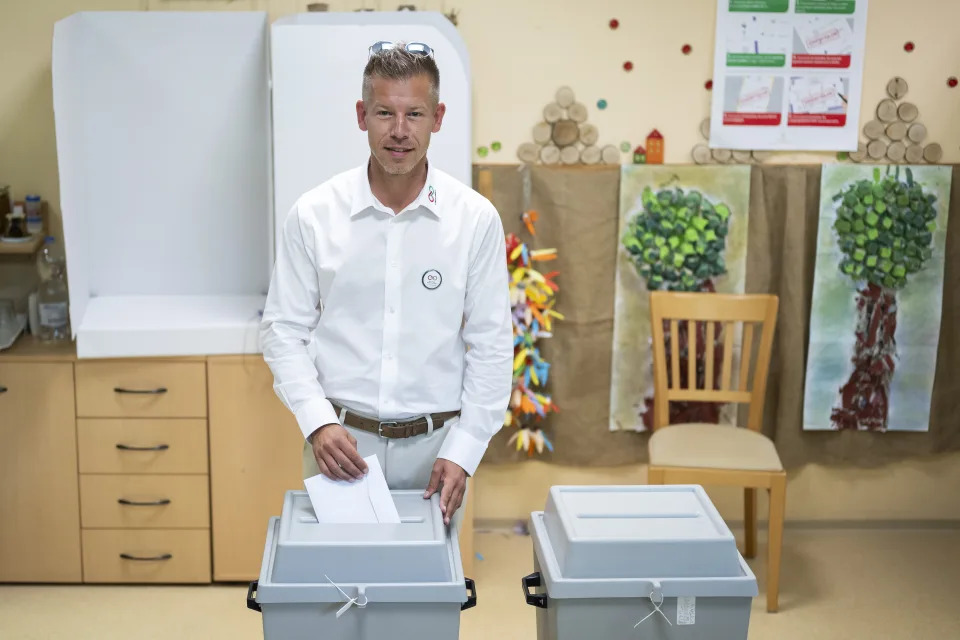

A challenger to Hungarian Prime Minister Viktor Orbán, Péter Magyar, arrives at a demonstration where he addresses supporters on the eve of European Parliament elections on Saturday, June 8, 2024.
(AP Photo/Denes Erdos)
No comments:
Post a Comment